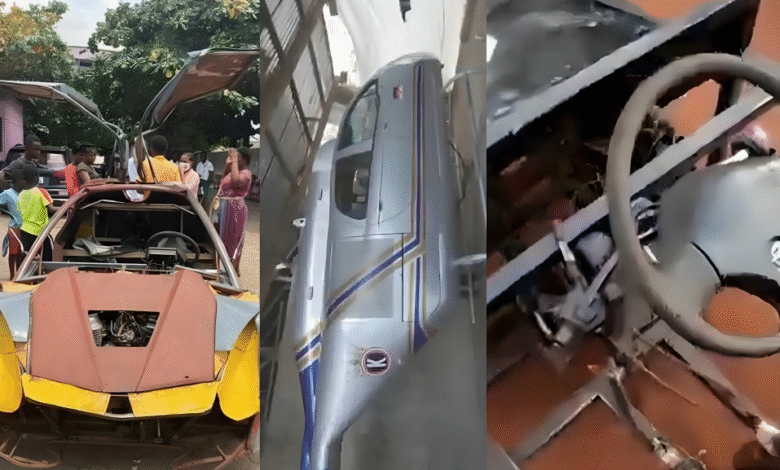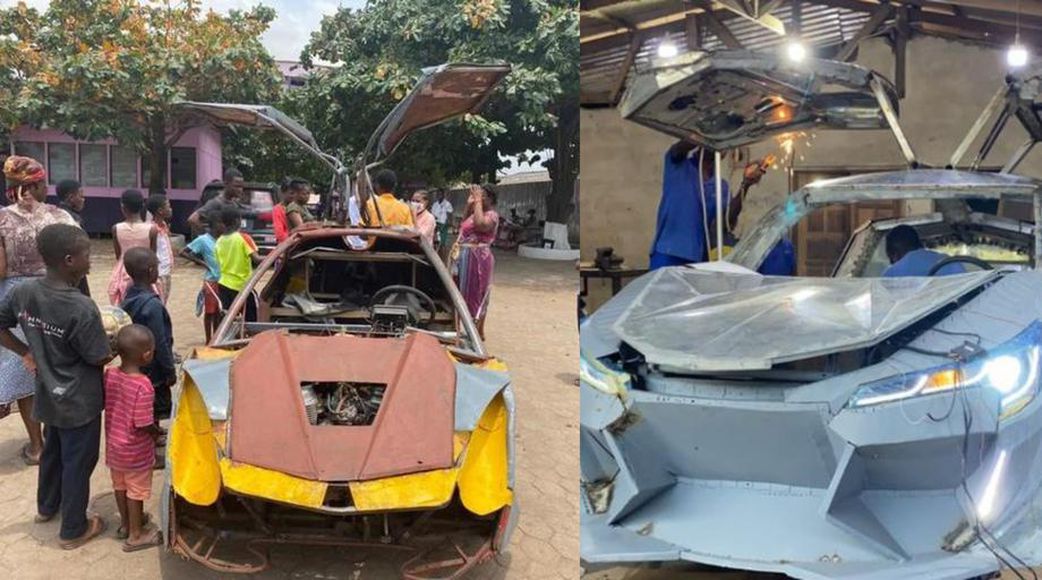Helicopters, cars, treadmills – all built from scrap: Why Ghana must support local inventors

Across the towns and villages of Ghana, a silent revolution is taking place not in politics or entertainment but in the minds and hands of young inventors.
From the heart of Techiman to the outskirts of Nkoranza and the bustling corners of Accra, Ghana’s youth are building cars, helicopters, mini trucks, and even eco-friendly treadmills largely with little to no financial support or institutional backing.
These are not just one-off hobby projects; they represent a movement of grassroots engineering that, if harnessed properly, could reshape the country’s technological future and position Ghana as a leader in African innovation.
Young minds, big dreams: Stories from the ground
Ghana’s President John Mahama has offered Anthony Joshua ‘special’ citizenship and appointed him as Africa’s boxing ambassador during the British-Nigerian boxer’s visit to Accra…
One of the most recent examples comes from Techiman, where a self-taught engineer has constructed a working helicopter using locally sourced metals and scrap materials. His motivation?
MUST READ: African Innovation: Ghanaian creates eco-friendly human-powered treadmill [Video]
To solve one of Ghana’s most pressing healthcare problems: emergency access in remote areas.
I’m not just doing this for fun. I want to help this country. My goal is to create helicopters that can help rather than ambulances that struggle to reach hinterlands on time when there is an emergency.
His ambition extends to supporting national operations like the Air Force and the Volta River Authority.
Despite the brilliance of his ideas, he is struggling alone and has called for urgent support in terms of machines, technical guidance, and funding.
READ ALSO: Kantanka remakes 18-year-old JHS graduate Kelvin Odartey’s famous car
The Nkoranza Warrior
In another inspiring case, a 20-year-old from Nkoranza built a motorised four-wheel mini truck from scratch to support his family’s charcoal business.
We’re farmers, and we have ideas, but no support
The mini truck, made from recycled materials, has drawn interest from people looking to buy.
However, lack of capital prevents him from scaling up production. He is now appealing to government and private stakeholders for help in acquiring proper machines and facilities to build more of these vehicles for local use.
Non-electric treadmill
READ MORE: Fire engulfs Korle Bu Medical School lab, halts key operations
Another notable innovation is a non-electric treadmill created by a young Ghanaian welder.
This human-powered treadmill operates using kinetic energy and works without electricity, making it ideal for regions with power instability.
It not only promotes good health but also aligns with several UN Sustainable Development Goals, including clean energy, innovation, and affordable technology.
The welder used only local materials, proving that impactful technology does not have to come from high-tech labs abroad.
These innovators are not alone.
The BECE car lord
In 2020, a then 18-year-old Kelvin Odartey caught national attention when he drove a self-built car to his Basic Education Certificate Examination (BECE) centre. The video went viral, gaining admiration across Ghana and beyond.
Recognising his potential, Kwadwo Safo Jnr, CEO of Kantanka Automobile, offered Odartey a scholarship and mentorship.
CHECK THIS OUT: How Donald Trump’s proposed travel ban on Ghana could affect the US economy
Today, Kantanka Automobile has unveiled a new vehicle, the Kantanka Akofena, that closely resembles the design Odartey originally built.
While an official partnership hasn’t been confirmed, the gesture alone is a powerful endorsement of local talent.
Odartey now leads a team building more complex cars under his self-made brand “Kejelvesuims”, a name combining “Kelvin” and “Jesus”. His story is a shining example of what can happen when talent meets opportunity.

What Must Be Done: Turning Talent into Industry
These young Ghanaian inventors are not anomalies; they are proof of the untapped potential that lies in every corner of the country. However, for this potential to become sustainable, systemic changes are required. Here’s what needs to be done:
READ ALSO: University of Ghana sanctions over 100 students for exam malpractices, misconduct
1. Establish local innovation hubs
The government, in collaboration with the private sector, must invest in technology and innovation hubs across the country, especially in rural areas.
These centres should provide tools, modern machines, workspaces, and mentorship for young inventors. While Accra has seen some tech development, places like Techiman, Nkoranza, and Wa are still waiting for platforms to support their talents.
2. Create a national innovation fund
There must be a dedicated fund to provide grants or soft loans to young inventors. Often, these young builders start and stop because they can’t afford materials or access modern machinery.
A government-backed innovation fund managed transparently can help eliminate this barrier. Private companies should be incentivised to contribute through tax breaks or recognition programmes.
3. Integrate technical skills into education
READ FURTHER: 20 most popular tourist attractions in the world
Ghana’s education system must move beyond theory and start investing seriously in vocational and technical education.
Young people should be encouraged to innovate from primary school through to tertiary institutions.
Practical science and engineering competitions must be regular, well-funded, and nationally televised to raise awareness and interest.
4. Forge partnerships with local industries
Imagine what could happen if Kantanka Automobile, Zoomlion, Ghana Grid Company (GRIDCo), or the Volta River Authority partnered with some of these local innovators.
These entities have both the machinery and the distribution channels to help scale up production. Public-private partnerships are key to transforming small inventions into mass-market solutions.
5. Promote local tech through media and events
More platforms like PHG Africa and Pulse Ghana need to spotlight these stories, not just as feel-good content but as national priorities.
READ THIS: 10 most secure prisons in the world where escape is impossible
Media coverage can attract attention from investors, NGOs, and even global partners. Tech fairs, exhibitions, and startup events should also highlight grassroots inventions alongside high-end corporate innovations.
6. Build a local market for indigenous products
Ghana must begin to trust and consume its own innovations. Just as Nigerians buy Innoson vehicles and Kenyans use their local payment solutions, Ghanaians should be encouraged to patronise indigenous technologies.
Government institutions should be mandated to procure a certain percentage of their tools and vehicles locally, giving inventors like Odartey or the Nkoranza builder a fighting chance.
The world is evolving fast, but the solutions to many of Ghana’s unique challenges may already exist within its borders.
From life-saving helicopters to eco-friendly fitness machines and self-made vehicles, young Ghanaians are demonstrating world-class innovation using the simplest tools and sheer determination.
However, dreams without support often die quietly. These young inventors do not need sympathy; they need systems. With the right funding, mentorship, training, and belief, these talents can grow into companies that create jobs, solve real problems, and drive Ghana’s industrialisation.
If we truly want to build Ghana beyond aid, then we must start building with what we have: our own people.








